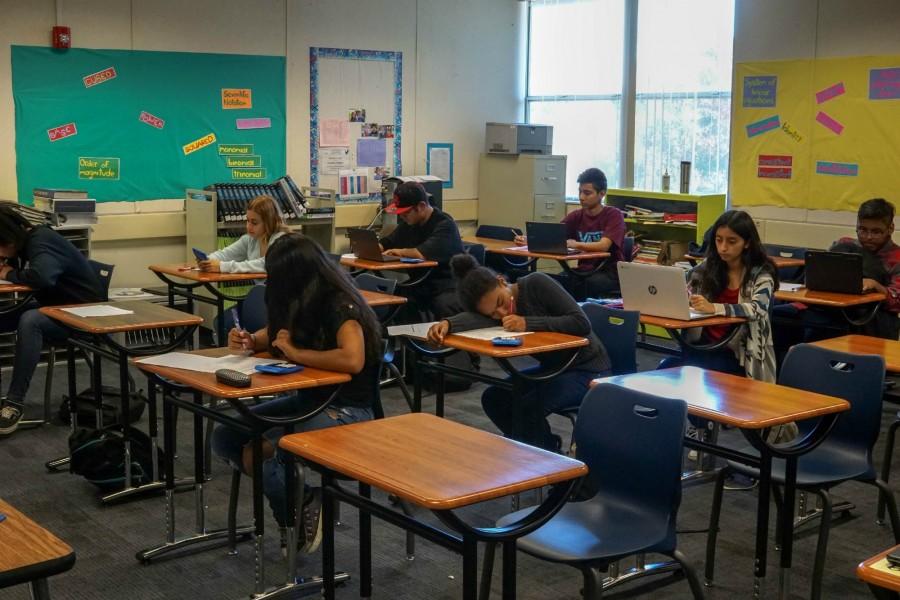District Passes Math Placement Policy
On Monday, October 12, the Mountain View Los Altos School District passed a math placement policy to maintain compliance with a new state law and respond to a complaint filed this summer by the Lawyers Committee for Civil Rights (LCCR). Following the policy’s passage, LCCR withdrew its complaint, which raised concerns over alleged biased placement of incoming freshmen into math classes.
In early October, the governor signed the California Mathematics Placement Act of 2015, a new California statute requiring all school districts to have a math placement policy.
“For us, this was the first time [we passed a math placement policy],” Associate Superintendent Brigitte Sarraf said. “Basically, what the [MVLA] policy says is that students that have completed a high school algebra course with passing grade… or have achieved a proficiency on a standardized test that has not been named yet should automatically be placed into the next level, which would be Geometry or Algebra II.”
The LCCR filed its complaint with the United States Department of Education on August 24, claiming the MVLA District was racially discriminating against minority groups when determining whether or not students were eligible for standard ninth-grade-level math classes, most commonly geometry.
Under MVLA’s open access policy, all students can enroll or switch into any level course, even if they were placed into a different level.
The LCCR requested data from the district regarding the courses students were enrolled in for eighth and ninth grade and what their CST scores and grades were. However, the district administration alleges that the group did not interpret the data correctly.
“We did them due diligence in finding the information they asked for,” Associate Superintendent Brigitte Sarraf said. “The problem was they never wanted any explanations of the data so they… formed their own conclusions.”
Before the Smarter Balanced Assessment (SBAC) exam based on the Common Core was introduced, the district utilized seventh grade CST scores as the main criterion for assessing a student’s preparation for future math classes. For the past two years, SBAC tests have replaced the CST. However those scores cannot be retrieved before the school year begins.
“In the absence of the CST scores, we included teacher recommendations and this particular group [LCCR] is very much opposed to the use of teacher recommendations,” Sarraf said.
In response, the School Board decided to adopt a new policy, recommended by the Silicon Valley Community Foundation, an organization that sponsors the LCCR.
The new policy states that math placement will depend only on objective measures, not subjective data such as teacher recommendations. Students who receive a passing grade or higher in their math class and on a standardized test should be promoted to the next course in ninth grade.
Without SBAC or CST scores, the district has found an alternative called the Math Diagnostic Testing Project. It was administered four years ago at LAHS and will be administered in April at feeder middle schools.
Grades from both seventh and eighth grade math classes will continue to be used as objective factors in determining placement. However, there are exceptions when objective data is not enough to advance students.
If students feel they are misplaced in a certain math class, they can transfer to the correct class. The district will look at factors including their previous courses, their grades and the class they were placed in.
“Every year we collect data from the middle schools, and if we feel there is a mismatch [we’ll] have a conversation with you and your parents and have you moved to the next level,” Sarraf said.
The math placement policy, having been approved by the governing board, will continue to be refined and the LCCR has officially withdrawn their complaint.
“We were looking for a way to make sure that there was….some oversight for how students are placed,” LCCR attorney Dana Isaac said. “Everyone has the same goal which is to make sure students have all opportunities available to them possible… it’s a good start.”





Egan McComb | Nov 18, 2015 at 5:24 am
I am glad to see this step taken, because I personally experienced this discrimination and witnessed its application against my 8th grade classmates in 2007. As one of my first experiences with the school, it has always diminished my respect for it and its administration. There were many other issues of which there was hearsay, and I hope moving forward that they will be addressed if they are real and continuing.